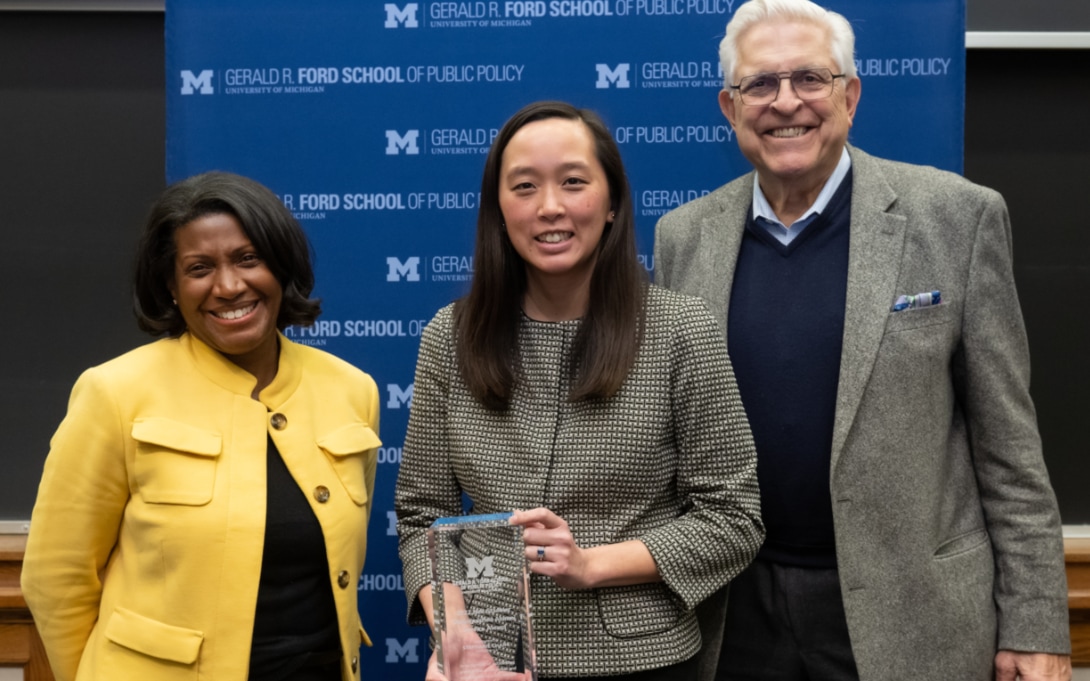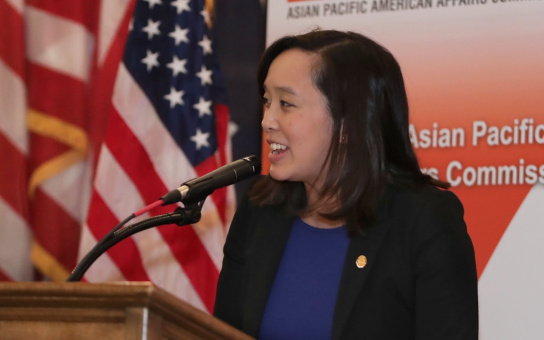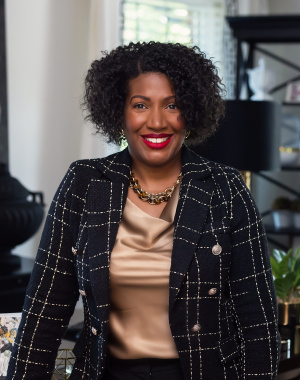
Coalition-building leads to good policy-making
By Daniel Rivkin
In 2014, Stephanie Chang (MPP/MSW '14) was approached by her community-organizing colleague, then-State Representative, now Congresswoman, Rashida Tlaib, to run for office. Chang wondered if as an Asian American woman she could represent what was a majority African American and Latino district in the Michigan House. After months of self-reflection, she realized that what people really want is simply good representation. She thought she could make a positive difference for the issues on which she had been working for nearly a decade. So she hit the doors. She found shared values and respect for hard work, and she won her first race for office.
That spirit of coalition-building, with a focus on social justice issues, has taken Chang through two terms in the Michigan State House and into the State Senate, where she is serving in her second term.
After the 2020 census, Sen. Chang's district now includes different areas in and around Detroit, moving north and east of her previous district. Even as it has changed with redistricting, the same ethos applies.
Balancing different communities' interests is something that we've been doing for my entire time in the legislature."
Stephanie Chang (MPP/MSW '14)
"Vulnerable communities always need help, no matter where they are," she says.
"One of the things that I have really enjoyed, even in my prior district, which is quite different from my new district, is that it's always a mix. Yet at the same time there are a lot of commonalities around issues: connecting people in Detroit with communities Downriver around industrial expansion, finding shared interests between East Side folks and Southwest Detroit folks on issues related to truck routing. Balancing different communities' interests is something that we've been doing for my entire time in the legislature," she says.
Before running for office, she worked as a community organizer with Michigan One/United Michigan, the Campaign for Justice, and the Center for Progressive Leadership, among others.
At the University of Michigan, as she pursued her MPP and MSW, she received the Ford School's David Bohnett Foundation Leadership and Public Service Fellowship, which gave her an opportunity to work in the City of Detroit's mayor's office.
That summer internship experience gave her perspective on her future government activity. "All of my work had been doing external advocacy and organizing, pushing for issues from the outside. Being able to see firsthand the considerations for the budget, and also the feasibility of policies, was really important. Now, as a lawmaker, it's important for me to still think about, 'OK, there are lots of ideas and lots of good ideas, but how do they actually get implemented?'"

As the Senate has been considering gun violence prevention legislation, Chang is listening to law enforcement agencies to make sure the measures work for them.
The 2022 elections produced a Democratic sweep in Michigan of the House, Senate, and executive branch with the re-election of Gov. Gretchen Whitmer. Chang says that gives her a chance to work on some issues that have been on the back burner for years, including protecting LGBTQ rights; the various gun safety bills; expanding the earned income tax credit; and two issues close to her heart, water affordability and equitable housing.
She sees her legislative work as a continuation of community organizing. She says she now is organizing her Senate colleagues on both sides of the aisle.
One major bipartisan accomplishment was passage of the Maritime and Port Facility Assistance Grant Program Act in July 2022, which put the state in a position to get millions in federal assistance for an industry that handles $4.1 billion in cargo each year. She saw that the Great Lake State wasn't promoting itself properly, and so she forged relationships with ports, companies, the Michigan Department of Transportation, and environmental groups across the state. "I realized that we can do so much to increase our maritime activity, create jobs, and at the same time, make sure we are doing it in a sustainable way that's protecting our environment."
On water affordability, she has had bills ready for eight years. "Now we can actually get something done. We need to look at everything and make sure we address, 'How can we actually get this done? How do we bring everyone on board? What are the changes we need to make?'"
Chang was the first female Asian American member of the state legislature and immediately created the Asian Pacific American Legislative Caucus. In Michigan, no district is majority Asian American, but getting that community's voice at the policy table is important to her. A second Asian American woman was then elected to the House. "Hopefully there will be a third and fourth and many more. I am always trying to get more people from the Asian American community engaged. It's something I take seriously."
In March, Chang came back to Weill Hall to participate in a Policy Talks event about "Governing for environmental justice," including her old friend Rep. Tlaib. At the start of the event, Celeste Watkins-Hayes, interim Ford School dean, presented Chang with the Neil Staebler Distinguished Service Award, recognizing alums who have contributed to their communities by enacting social change through policy.
"I'm grateful to be a Ford School alumna," Chang said. "Being a Ford School grad did provide a lot of really important skills and resources to be a successful lawmaker. I love the Ford School, so it's an honor to be able to receive the award."
More in State & Hill
Below, find the full, formatted spring 2023 edition of State & Hill. Click here to return to the spring 2023 S&H homepage.
